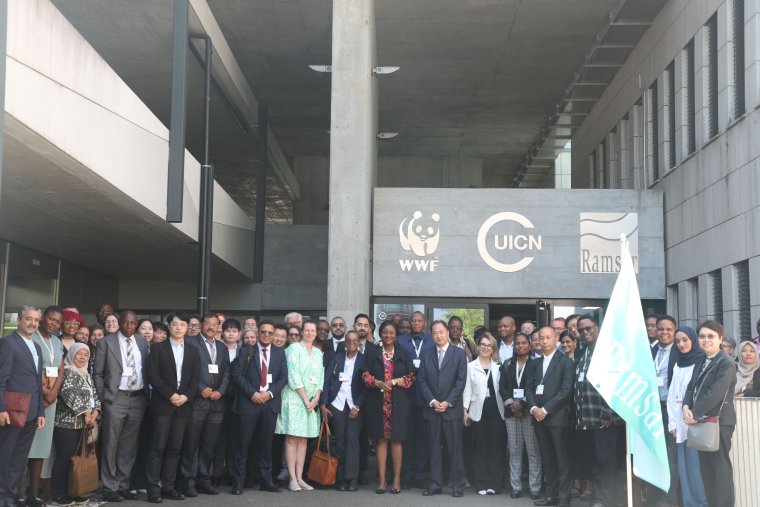
Record participation and key decisions highlight SC63

A high level of engagement set the tone for productive discussions and decision-making on critical wetland issues at the 63rd meeting of the Standing Committee of the Convention on Wetlands (SC63).
After a week of dialogue at the Convention’s headquarters in Gland, Switzerland, SC63 concluded on 7 June 2024. The event saw a remarkable turnout with 126 delegates from the Contracting Parties and 23 representatives from Observer organizations.
Several key decisions were made during the plenary sessions, reflecting the Committee’s commitment to advancing the Convention. These resolutions build on the momentum generated by SC62 and will continue to build through the upcoming meeting of the Conference of Contracting Parties (COP15) in July 2025.
Noteworthy Decisions
The Committee approved several important reports, including those from the Executive Team, Secretary General, Strategic Plan Working Group, Management Working Group, and Working Group on Institutional Strengthening. These reports provide insights into the ongoing activities, challenges, and achievements, forming the basis for informed decision-making and strategic planning. Parties also took the opportunity to continue discussions on the draft of the Fifth Strategic Plan.
The Committee decided on the dates for SC64, scheduled for 20 to 24 January 2025 in Gland, Switzerland.
The theme for both COP15 and World Wetlands Day 2025 was set as "Protecting wetlands for our common future". This theme emphasizes the connection between wetland conservation and a sustainable future, highlighting the importance of these threatened ecosystems in maintaining ecological balance and supporting biodiversity.
In preparation for COP15, the Committee approved the proposed theme and logo, the process for preparing and reviewing draft resolutions, and the categories for the Ramsar Wetland Conservation Awards. These awards will recognize achievements in categories such as Young Wetland Champions, Innovation, and Indigenous Peoples' Conservation and Wise Use.
Another notable decision was the establishment of a new Ramsar Regional Initiative (RRI), the Danube WILDisland initiative. This initiative aims to enhance regional collaboration and conservation efforts in the Danube River Basin.
Administrative Matters
The Secretariat’s Work Plan for 2025 was approved, outlining the strategic actions and initiatives for the upcoming year. This plan includes enhancing communication with Contracting Parties, guided by United Nations guidelines for gender-inclusive language, and strengthening intersessional collaboration among Parties.
Financial and budgetary matters were also addressed, with the Committee accepting the 2023 audited financial statements, approving the carry-forward of unspent funds, and noting the status of annual contributions and voluntary contributions from Contracting Parties.
Technical proposals and reports from the Scientific and Technical Review Panel (STRP) were considered, including plans for resourcing and implementing Waterbird Population Estimates and reviewing the classification system of wetland types. These initiatives are aimed at enhancing the scientific foundation for the designation of Wetlands of International Importance.
The Committee also focused on enhancing the visibility of the Convention and its synergies with other MEAs, noting their great satisfaction with Secretary General Musonda Mumba’s extensive work in these areas.
The meeting concluded with the establishment of working groups to consider enhancement in the process related to Ramsar Information Sheets (RIS) and the process of including sites on the List of Wetlands of International Importance.
Overall, the decisions from SC63 show the Parties’ commitment to the Convention and will continue to advance the common goal of ensuring healthy, sustainable wetlands worldwide.